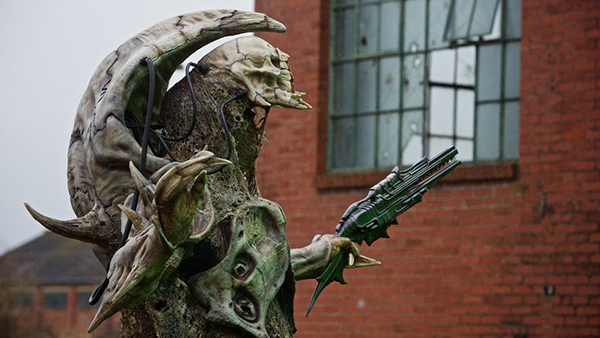Doctor Who – “Before the Flood”: The King and I
Breakdown
-
Writing
-
Use of Clara
-
Monsters
Summary
Season 9, Episode 4
Aired: Oct. 10, 2015
Director: Daniel O’Hara
Writer: Toby Whithouse
“I would bet money that Clara and Co. end up opening up the suspended animation chamber only to discover that the Doctor is safely inside with an outlandish explanation as to how he lived and why he appeared as a ghost.”
– me, last week
We are now four episode into the ninth season and so far all the episodes have been two-parters. I’ve enjoyed all four episodes, but I’d say the pattern thus far has been that I liked the first episode better than the second one. Both part ones have been really fun and full of colorful little touches, while both part twos are satisfying, but a bit bogged down by having to resolve everything from part one in a slightly convoluted fashion.
I really liked the Doctor’s opening speech to the audience. I think Peter Capaldi is uniquely suited to do that in a way that didn’t come off as cheesy or forced. His version of the Doctor is coming together as sort of a “cool college professor,” so talking about the bootstrap paradox, then playing the electric guitar feels right somehow.
The Fisher King, however, was a bit underwhelming. I’m not really sure I got a clear sense of the character, outside of him being a McGuffin there to drive the plot. He seemed pretty quick to gun down O’Donnell, but more than willing to let the Doctor stand there and talk to him for a long time, which seems inconsistent. And, besides being very tall and kind of cool looking, I’m not sure he had very many definable characteristics. The ghosts he created were far more visually-compelling and interesting than he actually turned out to be.
Speaking of O’Donnell, I was disappointed by her death. She was a very intriguing fan surrogate character who was unceremoniously killed so that a man would grieve over her. Steven Moffat gets a lot of flack for various reasons, a lot of which feels unfair, but decisions like this are pretty tough to defend when Monday morning quarterbacking the episode. It just seemed so pointless and uncompelling.
On the flip side, I thought the show did an amazing job with Sophie Leigh Stone’s Cass. It was really wonderful that they had a deaf character on the show who wasn’t just there as a prop or a gimmick. She was a clearly defined character who was really compelling to watch, particularly in the scene where she got upset with Clara for offering Lunn up as bait. She was easily the most compelling character from this two-parter and I find myself wishing we’ll see more of her, which is not something I usually feel about these one-off characters.
(The other thing that stands out about the two love stories is that Cass and Lunn feels really earned since it is organically revealed throughout the two episodes, but O’Donnell and Bennett feels like it comes out of nowhere moments before she is killed.)
Overall, I really dug this one. And I enjoy any time my smug predictions come true. It’s been a solid first four episodes. I hope they keep this momentum going.
Wibbly-wobbly, timey-wimey stuff
The Bootstrap Paradox is simply another name for something I’ve talked about in these recaps before – causal loops or the Predestination Paradox.
The Doctor did a really solid job explaining the concept in the opening, so I won’t bother rehashing what it is. But I did think it was worth noting that this is something that has come up in the show before, though normally the show doesn’t actually acknowledge it.
In fact, Clara’s entire existence on the show is an example of this phenomenon. As I explained back in 2013 in my recap of “The Name of the Doctor”:
Clara’s entire storyline with The Doctor is one big Predestination Paradox. The Doctor becomes obsessed with Clara after crossing paths with her at the Asylum of the Daleks and in Victorian London at Christmas. Both of those versions of Clara die, uttering the same final words, “Run you clever boy and remember.” Because of this, The Doctor woos modern-day Clara onto the TARDIS in order to get to the bottom of this bizarre mystery. As a result of their travels together, she jumps into the time stream, sending her back across The Doctor’s life, which is why she is there at the asylum and in Victorian London. This is one big causality loop, but it’s a self-correcting paradox since this is all self-contained, meaning we don’t have to worry about the universe exploding or anything since it is all limited to this one chain of events.
And if that isn’t wrinkling your brain at all, consider this – there was actually an even bigger causality loop created as well. When Clara jumps into the time stream and is scattered throughout The Doctor’s life, she goes back to the day he steals the TARDIS and tells him which one to steal. If the first Doctor takes a different TARDIS, that creates a giant butterfly effect and alters countless Who stories, since so many of them revolved around personality quirks in the specific TARDIS he chose. And again, if Clara isn’t there to tell him which one to take, The Doctor might never cross paths with Clara at all.
And another thing …
- Shouldn’t the TARDIS have translated the Russian on the walls into English?
- In some clear foreshadowing this week, O’Donnell mentions the “Minister of War,” which the Doctor is unfamiliar with.
- The Fisher King was played by Neil Fingleton, who is just shy of 7’8″ tall. He was voiced by Peter Serafinowicz, but his roar was provided by Corey Taylor of Slipknot.
- I really enjoyed the electric guitar intro.
Written by Joel Murphy. He loves pugs, hates Jimmy Fallon and has an irrational fear of robots. You can contact Joel at murphyslaw@hobotrashcan.com
Related Posts:



